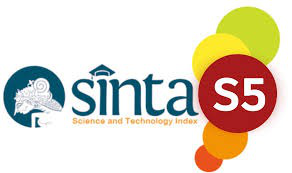The Effect of Gender and Household Education Expenditure in Indonesia
Abstract
This study empirically examines and analyzes the effect of gender on human capital investment in Indonesia. Using the logistic regression method and data sourced from 315,672 households in Indonesia, this study shows that the number of boys, the number of girls, the working status of the head of the household, and the highest education of the head of the household have a positive and significant impact on human capital investment in Indonesia. The results show that female household heads who work and invest in the cost of children's education are more significant than male household heads who also work. Higher the education level of the head of the household, the higher the income received and also investment for children. This research shows strong evidence of gender inequality in education spending that tends to be more towards girls. Based on the results obtained, development policies can consider gender differences in investment in labor and education. Increasing the school participation rate of women compared to men will increase the differentiation of the workforce by gender but also increase income inequality between men and women. Likewise, investment in education which tends to be more directed to women than men, will reduce income inequality.
Keywords
Full Text:
PDFReferences
Baliamoune-Lutz, M., & McGillivray, M. (2015). The impact of gender inequality in education on income in Africa and the Middle East. Economic Modelling, 47, 1–11. https://doi.org/10.1016/j.econmod.2014.11.031
Bayar, A. A., & Yanik Ilhan, B. (2016). Determinants of Household Education Expenditures : Do Poor Spend Less on Education? Topics in Middle Eastern and African Economies, 18(1), 83–111.
Chi, W., & Qian, X. (2016). Human capital investment in children: An empirical study of household child education expenditure in China, 2007 and 2011. China Economic Review, 37, 52–65. https://doi.org/10.1016/j.chieco.2015.11.008
Cooray, A., & Potrafke, N. (2011). Gender inequality in education: Political institutions or culture and religion? European Journal of Political Economy, 27(2), 268–280. https://doi.org/10.1016/j.ejpoleco.2010.08.004
Khajikhan, T. (2021). Gender Difference in Households’ Expenditure on Higher Education: Evidence from Mongolia. In Between Peace and Conflict in the East and the West (pp. 211–244). Springer International Publishing. https://doi.org/10.1007/978-3-030-77489-9_11
Kuvat, Ö., & Ayvaz Kizilgol, Ö. (2020). An Analysis of out of Pocket Education Expenditures in Turkey: Logit and Tobit Models. Ege Akademik Bakis (Ege Academic Review), 231–244. https://doi.org/10.21121/eab.795986
Ogundari, K., & Abdulai, A. (2014). Determinants of household’s education and healthcare spending in Nigeria: Evidence from survey data. African Development Review, 26(1), 1–14. https://doi.org/10.1111/1467-8268.12060
Pitt, M. M., Rosenzweig, M. R., & Hassan, M. N. (2012). Human capital investment and the gender division of labor in a brawn-based economy. American Economic Review, 102(7), 3531–3560. https://doi.org/10.1257/aer.102.7.3531
Ulusoy, B., & Yolcu, H. (2013). Household education expenditure of families at primary school level. Journal of Educational Sciences Research, 3(1), 1–27. https://doi.org/10.12973/jesr.2013.311a
Vu, H. (2012). Determinants of educational expenditure in Vietnam. International Journal of Applied Economics, 9(1), 59–72.
Wongmonta, S., & Glewwe, P. (2017). An analysis of gender differences in household education expenditure: the case of Thailand. Education Economics, 25(2), 183–204. https://doi.org/10.1080/09645292.2016.1168363
Zimmermann, L. (2012). Reconsidering gender bias in intrahousehold allocation in India. Journal of Development Studies, 48(1), 151–163. https://doi.org/10.1080/00220388.2011.629652
DOI: https://doi.org/10.46336/ijqrm.v2i4.192
Refbacks
- There are currently no refbacks.
Copyright (c) 2021 Tedy Di Oria Salam, M. Shabri Abd. Majid, Taufiq C Dawood, Suriani Suriani

This work is licensed under a Creative Commons Attribution 4.0 International License.
Published By:
IJQRM: Jalan Riung Ampuh No. 3, Riung Bandung, Kota Bandung 40295, Jawa Barat, Indonesia
IJQRM Indexed By:
 Creation is distributed below Lisensi Creative Commons Atribusi 4.0 Internasional.
Creation is distributed below Lisensi Creative Commons Atribusi 4.0 Internasional.








